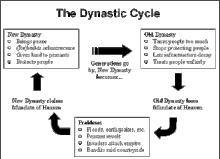
Back انتداب السماء Arabic Mandatu del Cielu AST Күк мандаты Bashkir Mandat del cel Catalan دەستووری ئاسمان CKB Mandát Nebes Czech Mandat des Himmels German Εντολή του Ουρανού Greek Mandato de la Ĉielo Esperanto Mandato del Cielo Spanish
| Mandate of Heaven | |||||||||||||||||||||||||||||||||||||||||
|---|---|---|---|---|---|---|---|---|---|---|---|---|---|---|---|---|---|---|---|---|---|---|---|---|---|---|---|---|---|---|---|---|---|---|---|---|---|---|---|---|---|
| Traditional Chinese | 天命 | ||||||||||||||||||||||||||||||||||||||||
| Simplified Chinese | 天命 | ||||||||||||||||||||||||||||||||||||||||
| Literal meaning | "Heaven's command" | ||||||||||||||||||||||||||||||||||||||||
| |||||||||||||||||||||||||||||||||||||||||
| Part of the Politics series |
| Monarchy |
|---|
 |
|
|
The Mandate of Heaven (Chinese: 天命; pinyin: Tiānmìng; Wade–Giles: T'ien1-ming4; lit. 'Heaven's command') is a Chinese political ideology that was used in ancient and imperial China to legitimize the rule of the king or emperor of China.[1] According to this doctrine, heaven (天, Tian) bestows its mandate[a] on a virtuous ruler. This ruler, the Son of Heaven, was the supreme universal monarch, who ruled Tianxia (天下; "all under heaven", the world).[3] If a ruler was overthrown, this was interpreted as an indication that the ruler was unworthy and had lost the mandate.[4]
It was also a common belief that natural disasters such as famine and flood were divine retributions bearing signs of Heaven's displeasure with the ruler, so there would often be revolts following major disasters as the people saw these calamities as signs that the Mandate of Heaven had been withdrawn.[5]

The Mandate of Heaven does not require a legitimate ruler to be of noble birth, depending instead on how well that person can rule. Chinese dynasties such as the Han and Ming were founded by men of common origins, but they were seen as having succeeded because they had gained the Mandate of Heaven. Retaining the mandate is contingent on the just and able performance of the rulers and their heirs.
Corollary to the concept of the Mandate of Heaven was the right of rebellion against an unjust ruler. The Mandate of Heaven was often invoked by philosophers and scholars in China as a way to curtail the abuse of power by the ruler, in a system that had few other checks. Chinese historians interpreted a successful revolt as evidence that Heaven had withdrawn its mandate from the ruler. Throughout Chinese history, times of poverty and natural disasters were often taken as signs that heaven considered the incumbent ruler unjust and thus in need of replacement.
The concept of the Mandate of Heaven also extends to the ruler's family having divine rights[1] and was first used to support the rule of the kings of the Zhou dynasty (1046–256 BCE) to legitimize their overthrow of the earlier Shang dynasty (c. 1600–1046 BCE). It was used throughout the history of China to legitimize the successful overthrow and installation of new emperors, including by non-Han Chinese dynasties such as the Qing dynasty (1644–1912). The Mandate of Heaven has been called the Zhou dynasty's most important contribution to Chinese political thought,[7] but it coexisted and interfaced with other theories of sovereign legitimacy, including abdication to the worthy and five phases theory.
- ^ a b Harari (2015), p. 219.
- ^ von Falkenhausen (1996), p. 9.
- ^ Ebrey 2010, p. 179.
- ^ Nylan (2007), p. 75.
- ^ Szczepanski, Kallie. "What Is the Mandate of Heaven in China?". About Education. Archived from the original on October 8, 2014. Retrieved December 4, 2015.
- ^ Lai (2002), p. 95.
- ^ Chen (2002), p. 291.
Cite error: There are <ref group=lower-alpha> tags or {{efn}} templates on this page, but the references will not show without a {{reflist|group=lower-alpha}} template or {{notelist}} template (see the help page).
© MMXXIII Rich X Search. We shall prevail. All rights reserved. Rich X Search